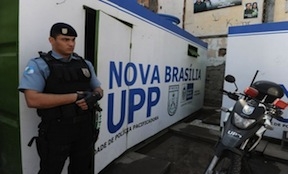One of Rio de Janeiro’s largest UPP-occupied slum complexes has seen a steadily deteriorating security situation in recent months, with conflicts leaving over 20 police wounded or dead, raising further questions about a pacification program that has been criticized as short-sighted.
Complexo do Alemao, home to 13 favelas sitting on the northern outskirts of Rio de Janeiro, has been the site of numerous recent clashes between security forces and alleged criminals. On July 27, two minors were hospitalized after gun fights with Police Pacification Unit (UPP) members and military police (BOPE), and two residents of the complex were killed the same weekend by stray bullets. Two more minors were killed and another wounded approximately a month earlier, and police claimed the victims were involved in drug trafficking.
So far this year, 23 police have been injured and five killed as a result of such confrontations, reported Correio do Brasil. The worrisome security situation led authorities to send 500 police into the complex on July 15 to conduct a sweep of the area, and another 300 UPP members as reinforcements on July 22.
A cable car responsible for transporting some 12,000 people from Complexo do Alemao each day was also recently suspended because of the ongoing shootouts, reported the UOL.
Meanwhile, in another major slum complex — Complexo da Mare — officials announced on July 29 that armed forces that entered in April to secure the area prior to the installation of a UPP would remain there for for an “indefinite” period, reported O Globo.
InSight Crime Analysis
Complexo do Alemao was first occupied in a massive military operation in late 2010, and a UPP post was installed in 2012. Since then, the complex — a former stronghold of Rio’s biggest drug gang, the Red Command — has continued to see outbreaks of violence. Following attacks earlier this year, military police reoccupied the complex.
For some time, there have been signs of growing cracks in the UPP program intended to retake Rio’s favelas, with continued violence in a number of key areas — such as the city’s biggest favela, Rocinha — indicating drug gangs have not been permanently pushed out. The surge of violence in Complexo do Alemao is another indication the program is falling short.
SEE ALSO: Brazil News and Profiles
The authorities’ failure to exert control in Complexo do Alemao comes amid growing criticism of the UPP program. One of the most serious complaints is that the initiative has been incomplete, with security surges not accompanied by social programs aimed at creating a lasting change in the conditions that help feed violence.

